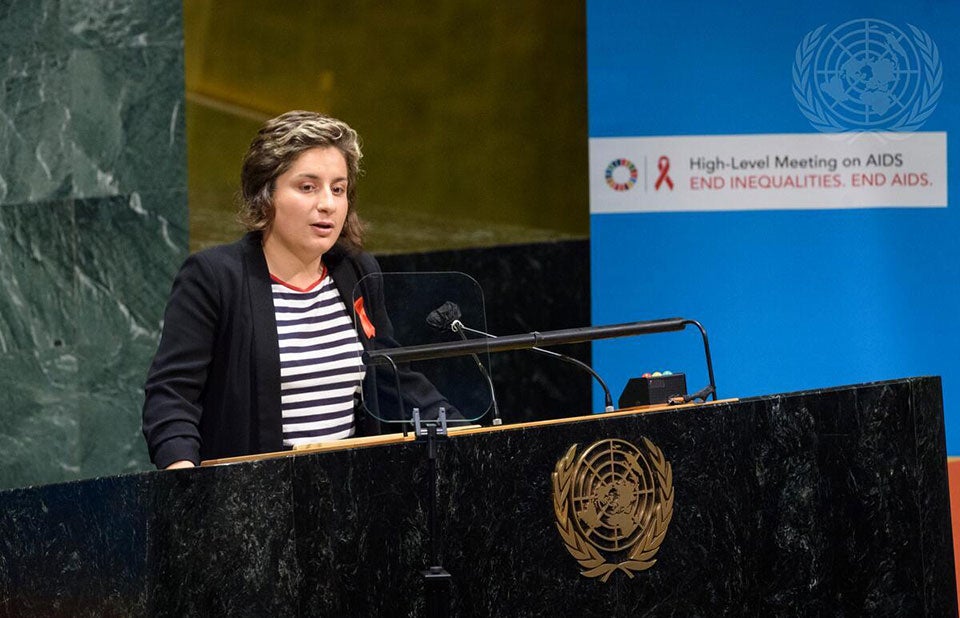Beijing+30 Youth Blog: Appealing education and awareness campaigns are essential to reduce HIV/AIDS stigma and discrimination
Date:

Photo: Courtesy of Yana Panfilova
My name is Yana Panfilova, I am 26 years old, and I am from Ukraine. I was born with Human Immunodeficiency Virus (HIV). As a child, I feared that I would die, but my mother helped me understand that HIV is not a death sentence - you can still live a fulfilling life by taking good care of yourself. I dreamed of a world where teenagers living with HIV could create a movement and work together without hiding.
At 13, I was ready to make this dream a reality. I joined adult activists living with HIV in Ukraine, which gave me the strength to publicly disclose my HIV status. I also wanted to broaden my advocacy beyond HIV to include solidarity with those living with other chronic health conditions and facing social exclusion. In 2015, I founded Teenergizer, a union of adolescents and youth in Ukraine and the Eastern Europe and Central Asia (EECA) region, providing peer psychosocial and psychological help to young people. For over ten years, I have worked to support and protect the rights of vulnerable young people in EECA, especially girls and women, aligning with the critical areas of concern outlined in the Beijing Declaration and Platform for Action.
Like millions of young Ukrainians, I was personally affected by Russia's war against Ukraine, forced to leave my home and aspirations in Kyiv and move with my mother and grandmother to Berlin as refugees. Every day of the war, I have supported tens of thousands of young Ukrainians, especially girls and women affected by it, providing opportunities to receive free, anonymous and confidential peer counseling on Teenergizer website. My focus mainly was and is on ensuring the stability of Teenergizer peer counseling system by continuous fundraising efforts. I am taking every possible step to ensure comprehensive advocacy of equal rights for education and access to services, including healthcare for adolescents and young people, especially girls. For example, I am collaborating with the First Lady of Ukraine on a new national effort to support the mental health of young Ukrainians affected by the war, with a special focus on girls and women. Furthermore, I am working with Teenergizer in a working group created by the Ministry of Education of Ukraine to promote comprehensive sexual education. This group, formed with the help of the UN Population Fund, the Ministry of Education and Science of Ukraine and the Ukrainian Institute for Educational Development, will develop and implement a new comprehensive sexual education program in schools.
Moreover, the issue of HIV remains highly relevant in Ukraine due to the ongoing war, which has significantly impacted the healthcare system and the delivery of essential services. According to UNAIDS, the estimated number of people living with HIV in Ukraine was 250,777 before the full-scale war. The onset of full-scale Russia’s war against Ukraine in 2022 led to significant population migration, affecting access to necessary therapy services and medication. This migration resulted in an uneven distribution of the population across different parts of the country and long waits for necessary documents to receive services abroad.
In the context of Ukraine, the Beijing Declaration and Platform for Action emphasizes the importance of integrating gender perspectives into HIV/AIDS prevention and treatment strategies. The platform calls for increased efforts to combat stigma and discrimination associated with HIV/AIDS, which often hinders affected people, particularly women, from seeking and receiving appropriate care. The recommendations for Ukraine involve a holistic approach that includes healthcare, education, and legal reforms to support women and girls affected by HIV/AIDS. This aligns with the goals of civil society organizations like Teenergizer in Ukraine.
How can we enhance the well-being of women and girls living with HIV in Ukraine?
First and foremost, we need justice and lasting peace! While we strive for peace, we can work on improving healthcare quality and access, ensuring well-equipped facilities with trained staff to provide comprehensive care for women living with HIV, integrating services like maternal health, mental health support, and gender-based violence assistance.
Legal and policy reforms, including anti-discrimination laws to protect women living with HIV from stigma and discrimination, are essential in all areas of life. It is also crucial to develop and implement gender-responsive policies that address the needs of women and girls living with HIV, focusing on health, social protection, and education.
Social support systems need to provide peer support, advocacy, and information sharing for women living with HIV, empowering them to overcome challenges. These could include vocational training, microfinance initiatives, and support for entrepreneurship, helping women living with HIV achieve financial independence.
Finally, targeted and appealing education and awareness campaigns are necessary to reduce the stigma and discrimination associated with HIV/AIDS. The aim should be to promote understanding and support for people living with HIV, contributing to a more inclusive society.
Looking ahead, I aim to enhance my leadership skills to expand Teenergizer's impact, advance national mental health initiatives, and continue advocating for equal rights. My goal is to serve as a model of resilience and hope for future generations of Ukrainians.
Let's continue working together to create a brighter future for all of us.
BIOGRAPHY: Yana Panfilova, a 26-year-old activist, is the founder of Teenergizer, a youth-led organization supporting adolescents and youth in Ukraine and Eastern Europe. Born with HIV, she has spent over a decade advocating for the rights of vulnerable young people, particularly women and girls.
Email: [ Click to reveal ]
Social media accounts: